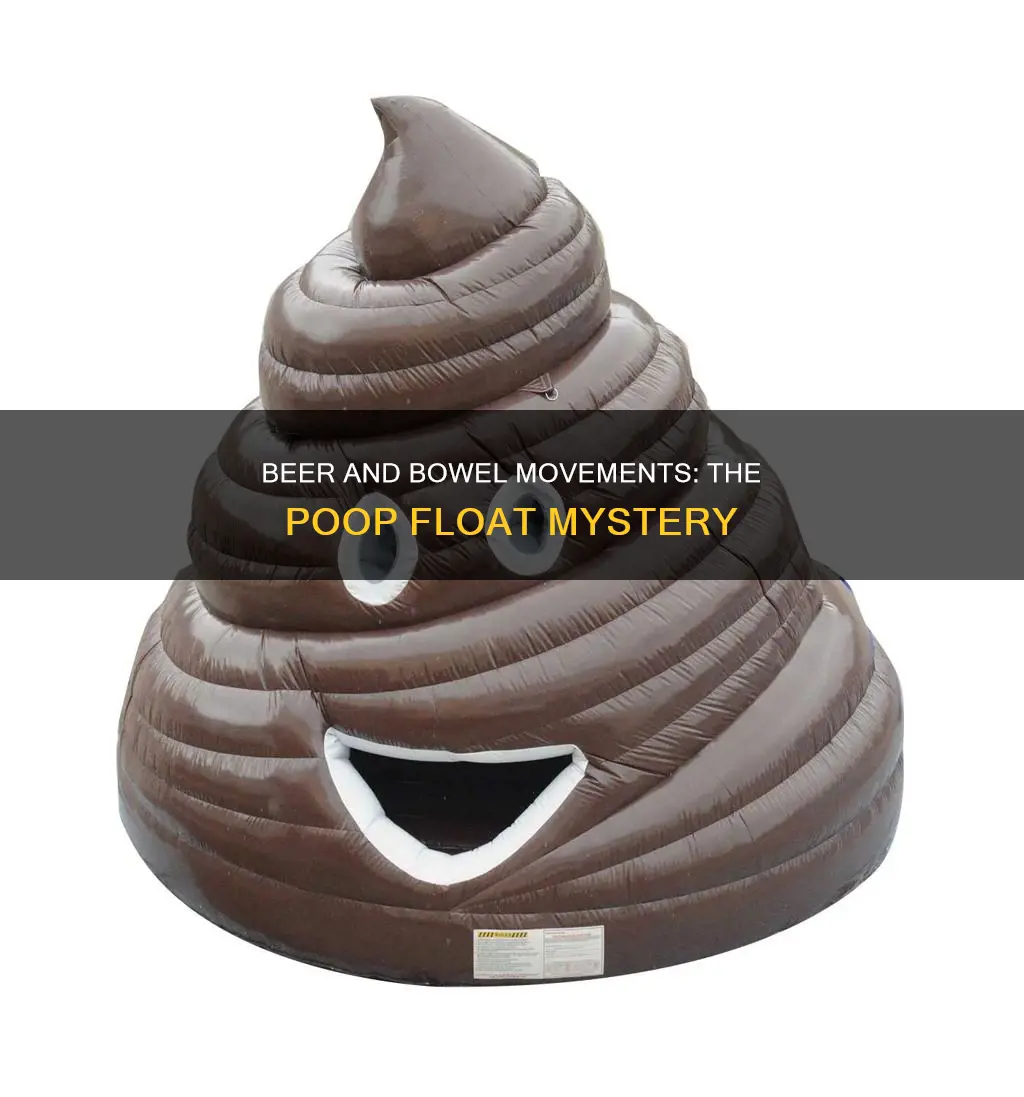
Drinking beer can have a significant impact on your digestive system and bowel movements. Alcohol can irritate the gut, speed up the digestive system, and affect how the body breaks down nutrients. This can result in either diarrhoea or constipation, and in some cases, can lead to chronic diarrhoea and serious intestinal inflammation. So, can drinking too much beer make your poop float? Let's find out.
| Characteristics | Values |
|---|---|
| Effect on bowel movements | Diarrhea or constipation |
| Reason | Alcohol can speed up the digestive system, irritate the gut, and affect the reabsorption of water |
| Diuretic effect | Alcohol suppresses the secretion of vasopressin, a hormone that regulates water retention, leading to increased urination |
| Gut motility | Alcohol increases gut motility, resulting in faster waste expulsion |
| Intestinal irritation | Alcohol can irritate the intestinal lining, affecting nutrient absorption |
| Hormonal changes | Alcohol alters vasopressin levels, affecting water balance and blood pressure |
| Liver function | Chronic alcohol consumption can lead to liver diseases such as cirrhosis |
| Gut microbiome | Alcohol can alter the composition of gut bacteria, impacting food fermentation and breakdown |
| Gastrointestinal bleeding | Specific alcoholic drinks like red wine and dark liquors may irritate the gastrointestinal tract and cause bleeding |
What You'll Learn
- Ethanol in alcohol speeds up the digestive process, leading to a more urgent need to poop
- Alcohol can cause constipation due to dehydration
- Alcohol suppresses the secretion of vasopressin, a hormone that regulates water retention
- Drinking on an empty stomach can worsen the effects of alcohol on bowel movements
- Alcohol can irritate the gut, causing inflammation in the lining of the intestines

Ethanol in alcohol speeds up the digestive process, leading to a more urgent need to poop
Ethanol, a component of alcohol, can speed up the digestive process, leading to an urgent need to defecate. This is due to its ability to increase gut motility, or the contractions of the gastrointestinal muscles, resulting in waste being expelled from the body at a faster rate.
When ethanol is consumed, it can irritate the intestinal lining, known as the epithelial layer. This irritation impairs the absorptive properties of the lining, leading to improper nutrient absorption. As a result, the body expels whatever it cannot absorb, leading to increased bowel movements.
The ethanol in alcohol also suppresses the secretion of vasopressin, an antidiuretic hormone responsible for regulating water retention in the body. With decreased vasopressin levels, the body increases urination and loses more fluid than usual. This can lead to dehydration, which is a common cause of constipation.
The combination of faster gut motility and decreased water absorption can result in softer or watery stools. This effect is more pronounced in individuals with irritable bowel syndrome (IBS), inflammatory bowel disease, celiac disease, and other gastrointestinal conditions.
Additionally, alcohol can alter the composition of gut bacteria, leading to differences in the fermentation and breakdown of food. This can contribute to the production of foul-smelling compounds and further impact the consistency of stools.
The impact of ethanol on gut motility and water absorption can lead to an urgent need to defecate, often resulting in softer or watery stools. This effect is particularly noticeable for individuals who consume excessive amounts of alcohol or those with underlying gastrointestinal conditions.
Passover Beer: What Jews Can Drink and Avoid
You may want to see also

Alcohol can cause constipation due to dehydration
Drinking too much beer can indeed cause constipation, and this is often due to dehydration. Alcohol is a diuretic, which means it makes your body produce more urine. This can lead to dehydration, which is one of the main causes of constipation.
When you drink alcohol, your body is unable to reabsorb water effectively. This is because alcohol suppresses the secretion of vasopressin, a hormone that helps regulate water retention. With less vasopressin, you will need to urinate more, and your body will not be able to retain enough water. As a result, your large intestine will try to absorb as much water as possible from your waste before it leaves your body, leading to hard, dry stools that are difficult to pass.
The type of alcohol you consume can also contribute to constipation. Drinks with a high alcohol content, typically more than 15%, may slow down the movements of the muscles in your gut, further impacting your bowel movements. Additionally, chronic alcohol consumption can irritate the gut and cause intestinal inflammation, making it even harder for your body to absorb water effectively.
To prevent alcohol-induced constipation, it is important to drink in moderation and stay hydrated by consuming plenty of water or other fluids. It is also advisable to eat a balanced meal with fiber-rich foods before drinking, as this can help reduce irritation in your intestines and slow down alcohol absorption.
In addition to constipation, excessive alcohol consumption can also lead to diarrhea, another common side effect experienced by many drinkers. The ethanol in alcohol speeds up the digestive process, leading to urgent and frequent bowel movements that can be watery and loose. This is often referred to as "DADS" (day-after-drinking stool) or the "beer sh*ts."
Drinking Beer with Aligners: What You Need to Know
You may want to see also

Alcohol suppresses the secretion of vasopressin, a hormone that regulates water retention
When alcohol is consumed, it inhibits the release of vasopressin, leading to increased urination and dehydration. This disruption in vasopressin secretion contributes to the diuretic effect of alcohol, resulting in frequent urination and altered bowel movements. The inhibition of vasopressin secretion prevents the kidneys from reabsorbing water, leading to increased water content in the stool, which can result in softer or watery stools.
Additionally, alcohol can irritate the lining of the intestines, further contributing to bowel movement changes. The ethanol in alcohol accelerates the digestive process, reducing the time available for the colon to absorb water, which can also lead to watery stools.
The impact of alcohol on vasopressin secretion and its subsequent effects on water retention and bowel movements provide insights into the complex relationship between alcohol consumption and digestive health.
Beer Enjoyment Without the Alcohol: Is It Possible?
You may want to see also

Drinking on an empty stomach can worsen the effects of alcohol on bowel movements
Drinking on an empty stomach can be dangerous, and it can also worsen the effects of alcohol on bowel movements.
Alcohol can affect the way your body digests food, and this can result in either constipation or diarrhea. When you drink on an empty stomach, the alcohol passes quickly from the stomach into the small intestine, where it is absorbed into the bloodstream. This intensifies the side effects of drinking, such as difficulty with thinking and coordination.
The ethanol in alcohol speeds up the digestive process, which is why you may feel the urge to go to the bathroom right after waking up. This increase in gut motility means that the colon has less time to absorb everything, including water, which can lead to watery stools.
Additionally, alcohol suppresses the secretion of vasopressin, an antidiuretic hormone that regulates the body's water retention. This inhibition prevents the reabsorption of water by the kidneys, leading to increased urination and dehydration. Dehydration is one of the main causes of constipation.
Drinking on an empty stomach can also increase your risk of experiencing a hangover, which is often accompanied by bowel movement issues. To reduce the chances of a bad reaction to alcohol, it is recommended to eat before drinking.
Beer and Drink Service Laws in North Carolina
You may want to see also

Alcohol can irritate the gut, causing inflammation in the lining of the intestines
Drinking too much beer can indeed irritate the gut and cause inflammation in the lining of the intestines, leading to changes in bowel movements. This is due to the toxins in alcohol, which can overwhelm the gastrointestinal tract and the liver, resulting in damage to the gastrointestinal tract and other organs.
Alcohol and its metabolites promote intestinal inflammation through multiple pathways, creating a cycle of inflammation and organ damage. This inflammation can lead to intestinal permeability, allowing pathogens and toxins to enter the bloodstream. This is often referred to as "leaky gut syndrome". In addition, alcohol can alter the balance of bacteria in the gut, leading to an increase in bacteria that cause inflammation and irritation.
The epithelial layer of the intestines can become irritated and lose its absorptive properties, leading to an increased need to expel waste. This irritation can also cause inflammation in the gut lining, known as gastritis, which can lead to more serious conditions such as ulcers, anemia, or stomach cancer if left untreated.
To prevent alcohol from irritating the gut and causing inflammation, it is important to drink in moderation, typically defined as one standard drink per day for women and two for men. Avoiding caffeine and mixers high in sugar can also help reduce irritation.
Beer and Driving: Half a Beer, DUI Risk?
You may want to see also
Frequently asked questions
Drinking beer can speed up the digestive system, which leads to a bowel movement. Beer can also irritate the gut, causing inflammation in the lining of the intestines, which stops the gut from absorbing nutrients as well as usual.
Alcohol is a diuretic, which means it makes the body produce more urine than normal. This can lead to dehydration, which is one of the main causes of constipation.
Drinking beer can cause diarrhea, which results in a loose, watery stool. However, it is not clear if this will make poop float.







